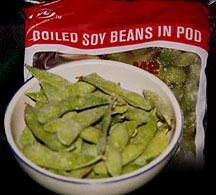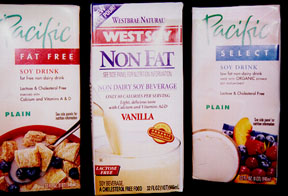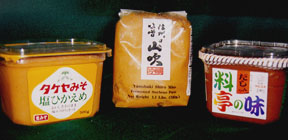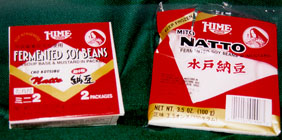
Prepared by
Katherine Cason, PhD, RD
Clemson University
Page 3 of 4
Soy oil accounts for 79% of the
edible fats and oils used annually in the United States.
|
|
Click here for the printable (Word) version of the lesson
What
are Some Soy Foods?
 Soybeans and soy products, such
as soybean oil, soy flour and soy protein, are used extensively
in a variety of foods found in a typical supermarket. Soy beverages,
tofu, textured soy protein and soy flour can be used as foods
or incorporated into many dishes, baked goods and other foods.
The soybean and its components give foods sound nutrition, good
taste, a long shelf-life and a competitive price. Many of the
products available are listed below. Soybeans and soy products, such
as soybean oil, soy flour and soy protein, are used extensively
in a variety of foods found in a typical supermarket. Soy beverages,
tofu, textured soy protein and soy flour can be used as foods
or incorporated into many dishes, baked goods and other foods.
The soybean and its components give foods sound nutrition, good
taste, a long shelf-life and a competitive price. Many of the
products available are listed below.
Soy oil accounts for 79% of the edible
fats and oils used annually in the United States. Soybean oil
contains 61% polyunsaturated and 24% monounsaturated fatty acids,
totaling 85% unsaturated fatty acids. Soybean oil is particularly
rich in linoleic and linolenic fatty acids. Soybean oil is a
chief component of mayonnaise, margarine, salad dressing and
vegetable shortening.
Soy flours are the simplest form of soy protein.
The flour is produced by grinding and screening defatted soy
flakes. Soy flour is about 50% protein. Soy flour can be found
in baked goods, noodles, cereals, pancake flour, frozen desserts
and instant milk drinks.
Soy isolates are developed through a chemical
process in which most of the protein is withdrawn from the defatted
flake. The resulting product contains about 90% protein and very
little moisture. Soy isolates are the chief component of many
dairy-like products, including processed cheese, soymilk, infant
formula, non-dairy frozen desserts and coffee whiteners. They
are used to add texture to meat products and are valued for their
emulsifying properties.
Soy concentrates contain about 65% protein and
retain most of the bean's dietary fiber. Concentrates also add
texture and help foods retain moisture. Surimi, protein drinks,
soup bases and gravies contain soy concentrates.
Soybeans, especially the outer hull, are an
excellent source of dietary fiber (six grams fiber per one cup
cooked). When soybeans are processed, the hull is removed and
then processed further to create a fiber additive for breads,
cereals and snacks. Soybeans contain both soluble and insoluble
fiber. Soluble fiber may help lower serum cholesterol and control
blood sugar. Insoluble fiber increases stool bulk, may prevent
colon cancer and can help relieve symptoms of some digestive
disorders.
Whole soybean foods such as full fat flour is
made from whole soybeans and therefore has the same fat, protein
and dietary fiber content as the whole bean. Full fat flour is
used for doughnut mixes, pie crusts, pancake batters and other
baked goods.

Soymilk is made from ground soybeans that are
mixed with water to form a milk-like liquid. It is consumed by
dairy-sensitive individuals as well as strict vegetarians who
eat no animal proteins. Soymilk is an excellent source of protein,
B-vitamins and iron, and, if fortified, provides adequate calcium.
It has low levels of saturated fat and no cholesterol.
Textured soy protein (known commonly as TSP
or TVP) is made from defatted soy flour which is compressed and
dehydrated into a product rich in protein and fiber, low in fat
and sodium. TSP is used as a meat enhancer, extender and substitute.
Mainstays of healthy diets throughout the East for centuries,
Asian whole soybean foods are slowly gaining acceptance in the
United States as a unique source of nutrition that can help reduce
saturated fat in the diet. Whole soybean foods are high in protein,
fiber and unsaturated fat, and rich in vitamins and minerals.
They also show many anticarcinogenic properties related to the
unique benefits of soy isoflavones.
 Tofu (soybean curd) is
a bland, cheese-like cake formed from soymilk by adding a coagulant
(typically calcium sulfate) to the milk to form curds that are
then shaped and pressed into cakes. Depending on the coagulant
used, tofu is rich in minerals and is an excellent source of
high-quality protein, polyunsaturated fats (including linoleic
and linolenic acids), B vitamins and iron. Versatile and nutritious,
tofu can be used in soups, salads, pastries, sandwiches and spreads.
It can also be used as an alternative to yogurt or soft cheese. Tofu (soybean curd) is
a bland, cheese-like cake formed from soymilk by adding a coagulant
(typically calcium sulfate) to the milk to form curds that are
then shaped and pressed into cakes. Depending on the coagulant
used, tofu is rich in minerals and is an excellent source of
high-quality protein, polyunsaturated fats (including linoleic
and linolenic acids), B vitamins and iron. Versatile and nutritious,
tofu can be used in soups, salads, pastries, sandwiches and spreads.
It can also be used as an alternative to yogurt or soft cheese.

Miso is a thick, high-protein paste made from
soybeans, salt and a fermenting agent (usually an Aspergillus
mold culture) that is similar in taste and color to soy sauce.
Sometimes a grain, such as rice and barley, is fermented with
the soybeans for additional flavor. Miso is popular as a soup
and breakfast drink in Japan. The fermenting yeast in miso makes
it a rich source of vitamin B-12. In addition, research has shown
that antioxidant components in miso may inhibit formation of
oxidized cholesterol that forms plaque in the arteries (Santiago
et al., 1992).

Natto is made of fermented, cooked whole
soybeans and offers nutritional values similar to those found
in miso. It has a sticky, viscous coating and is strong-smelling,
with a cheesy texture. It is used as a spread or in soups.
 Tempeh is
made of whole, cooked soybeans infused with a culture to form
a dense, chewy cake. It is a good source of fiber protein, polyunsaturated
fats and lecithin, as well as useful amounts of calcium, iron,
magnesium, potassium and some B vitamins. Tempeh is
made of whole, cooked soybeans infused with a culture to form
a dense, chewy cake. It is a good source of fiber protein, polyunsaturated
fats and lecithin, as well as useful amounts of calcium, iron,
magnesium, potassium and some B vitamins.
Soybean sprouts are rich in vitamins A, B and
C and are eaten raw in salads or cooked.
Soy sauce, the most widely recognized of soybean
foods, is fermented from a mixture of whole soybeans, wheat flour
and fermenting agents, such as yeast, for about 18 months. Then
the liquid is extracted and processed. Soy sauce adds sodium
and flavor to the diet.
   [ LESSONS || SITE
MAP || LOCAL AGENTS || RESOURCES || PEOPLE ]
[ LESSONS || SITE
MAP || LOCAL AGENTS || RESOURCES || PEOPLE ]
 Issued in furtherance of Cooperative Extension
work, Acts of Congress of May 8 and June 30, 1914, in cooperation
with the United States Department of Agriculture. The Louisiana
Cooperative Extension Service provides equal opportunities in
programs and employment. Information and Graphics on this site
are copyright protected by LSU Agricultural Center's Louisiana Cooperative Extension Services.
For more information
on the EFNEP program, contact EFNEPMail@agcenter.lsu.edu. Issued in furtherance of Cooperative Extension
work, Acts of Congress of May 8 and June 30, 1914, in cooperation
with the United States Department of Agriculture. The Louisiana
Cooperative Extension Service provides equal opportunities in
programs and employment. Information and Graphics on this site
are copyright protected by LSU Agricultural Center's Louisiana Cooperative Extension Services.
For more information
on the EFNEP program, contact EFNEPMail@agcenter.lsu.edu.
|